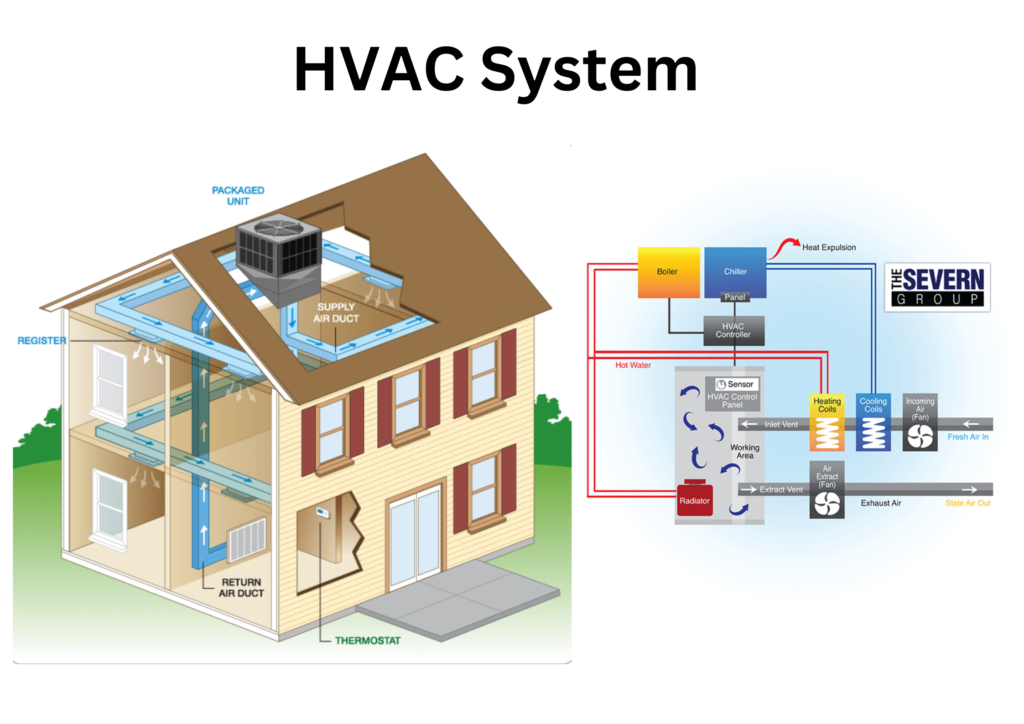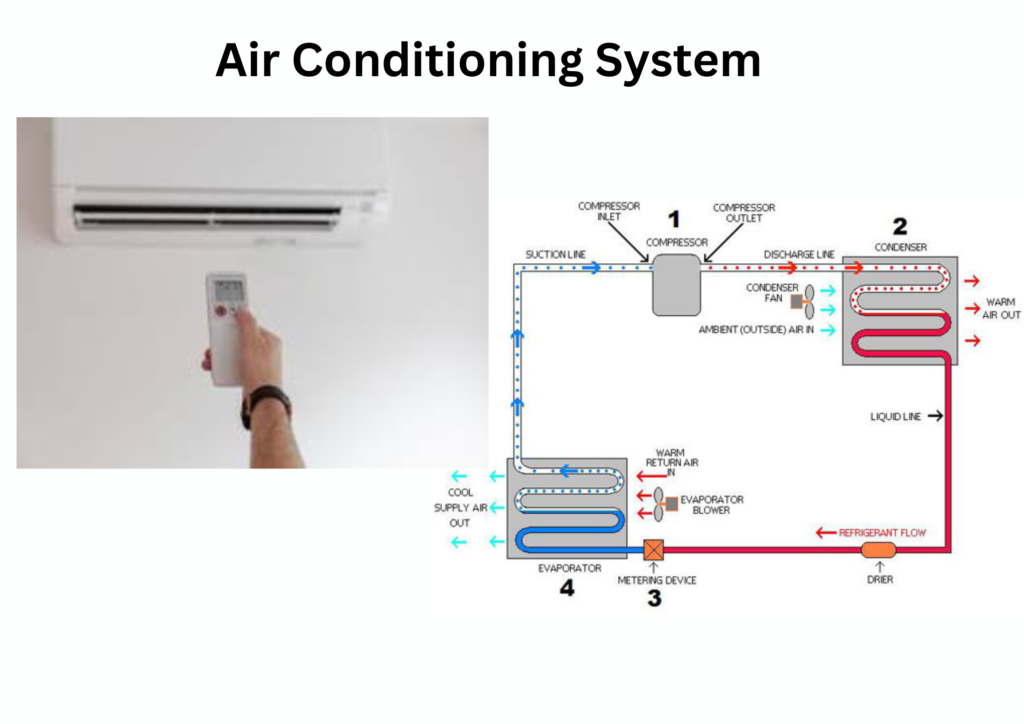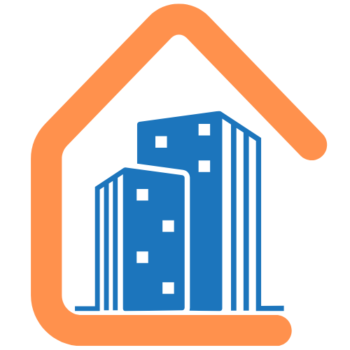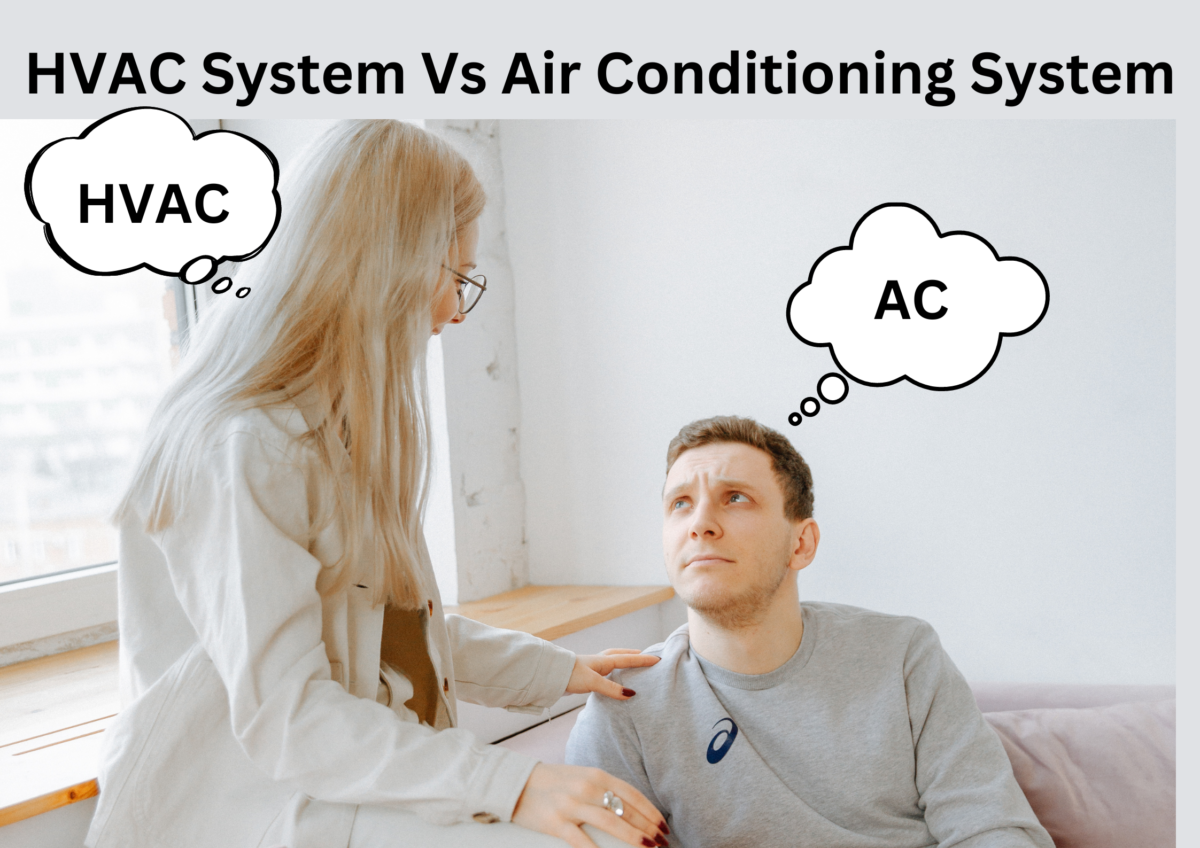Do you know HVAC and AC are two completely different terms? But these two terms are often used interchangeably.
The term AC stands for air conditioning and this system is used for cooling and dehumidifying the indoor air of an enclosed space. Whereas HVAC stands for Heating, Ventilation, and Air Conditioning. This system is utilized for both heating and cooling purposes and also to improve indoor air quality.
This article explains in detail the definition, types, pros, cons, and costs of both HVAC and AC systems. Read the full article to get a clear idea of “HVAC System Vs Air Conditioning System”.
Definition
Definition of HVAC System
HVAC refers to heating, Ventilation, and Air Conditioning. An HVAC system is a complete home comfort system that is used for multiple purposes such as heating, cooling, humidity control, and improving indoor air quality.
It has several components that work together to create a comfortable indoor environment. It keeps the indoor area warm during winter and creates a cool and comfortable environment on hot summer days. This system also consists of ventilation and filtration technology that traps airborne pollutants, dust mites, viruses, bacteria, etc. from the air.
So, in addition to supplying heat or cool air, it also circulates clean and purified air throughout the home and maintains the ideal humidity level.
An HVAC system consists of several components including an air conditioning unit, heat pumps, air handlers, furnaces, air filters, ductwork, motor blowers, etc.
Definition of Air Conditioning (AC) System
Air conditioning (AC) is a process that maintains the desired temperature of the indoor air. It also keeps the humidity at an optimal level, and supplies purified air in indoor spaces. An air conditioning system is installed to maintain a level of personal comfort inside an enclosed space.
An air conditioning system consists of various parts including a compressor, condenser, evaporator coils, fan, etc. It transfers the heat and moisture from the indoor air to the outside and circulates the cooled and purified air inside the indoor spaces. These systems are used for both residential and commercial buildings.
Working Principle
Working Principle of HVAC System
The HVAC system works according to the user’s requirement whether they need heating or, cooling. The operating process changes to maintain the desired temperature inside a home or, a building.
- When the user requires high temperature inside the indoor area, the heating unit is activated. Inside this unit fuel is burned and heat is generated and then the indoor air is passed over this unit. The warm air is then circulated back inside the indoor space.
- When the user needs cooled air, the air conditioning unit comes into action. The air inside the indoor space is passed over the refrigerant coil where the heat is absorbed by the refrigerant and transferred outside the home. The cooled air is then circulated back inside the indoor area.
- If the humidity level needs to be controlled, the air conditioning unit is activated. When the moisture air passes over the refrigerant coil, the moisture converts into liquid and drips down from the coil. The cooled air free from moisture is then distributed inside the indoor area.
- An air filter with advanced filtration technology is placed in between the air return setup and the blower which filters out the airborne particles, dust, bacteria, etc. from the air and supplies the purified air inside the home.

Working Principle of Air Conditioning (AC) System
The 3 major components of an air conditioning system are a compressor, an evaporator coil, and a condenser coil. The basic working principle of an air conditioning system is based on the absorption of heat when a liquid converts into a gas.
- The blower fan which is placed across the evaporator coil, draws the indoor air into the evaporator coils. The heat from the air is absorbed by the refrigerant inside the evaporator coils. The fan also forces the cooled air out of the evaporator and circulates it inside the indoor area.
- In the beginning, the refrigerant inside the evaporator coil is in low-temperature and low-pressure liquid form. When it absorbs the heat from the indoor area, it transforms into a low-pressure gas.
- The low-pressure gas is then transferred outside the home, where it reaches the compressor unit. The compressor compresses the low-pressure gas into high-pressure high-temperature gas and transfers it to the condenser coil.
- In a condenser unit, the heat absorbed by the refrigerant is released into the outside air. The fan blows air over the condenser coil and converts the refrigerant into a high-pressure liquid.
- The refrigerant is then passed through the expansion valve and the refrigerant becomes a low-pressure low-temperature liquid. This process continues to maintain the desired temperature of the indoor area.

Types
Types of HVAC System
The 5 major types of HVAC systems are
- Electric Furnace and Air Conditioning System
- Furnace and Split AC System
- Heat Pump and Air Handler System
- Ductless Mini-Split System
- Geothermal Heat Pump System
Types of Air Conditioning (AC) System
The 7 major types of air conditioning systems are
- Window Air Conditioner
- Central Air Conditioner
- Ductless Mini Split System
- Portable Air Conditioner
- Geo-Thermal Air Conditioner
- Floor Mounted Air Conditioner
- Smart Air Conditioner
Pros and Cons
Pros of HVAC System
- Improves Indoor Air Quality:
Due to the improper air circulation inside the home, the quality of the indoor air is more polluted than the outdoor air. The contaminated indoor air causes severe respiratory problems, allergies, colds, etc. An HVAC system provides fresh, purified, and conditioned air, increasing indoor air quality.
- Saves Energy
The installation cost of an HVAC system is high, but in the long run, it offers some energy-saving benefits. As both the heating and cooling units are placed in one unit it consumes comparatively less power. Again, the system can also be operated by renewable energy sources which saves a lot of energy.
- Consistent Temperature Control
The HVAC system runs all day and all night to maintain the desired indoor temperature. It provides cool air if the outdoor temperature is high and creates a warm environment inside if the outdoor temperature is very low.
- Quieter Operation
The components of an HVAC system that produces noise are placed outside the home or a building. So, inside the home, you will not be disturbed by any noise produced by the HVAC system.
- Increases Property Value
A home or, a building that is integrated with an HVAC system is costlier than any ordinary home. Installation of an HVAC system increases the property value.
Cons of HVAC System
- Expensive: The Installation costs of HVAC systems are very high.
- Requires Regular Maintenance: To function properly the system needs regular maintenance and servicing. You have to get help from professionals to do it.
- Harmful Environmental Effect: The chemical gases released by the system is very harmful to the environment.
Pros of Air Conditioning (AC) System
- Increases Indoor Air Quality:
The filtration technique implemented in the air conditioning system extracts airborne pollutants, viruses, allergens, etc. from the air and distributes purified air inside the home.
- Increases Productivity:
An air conditioning system creates a cool and comfortable environment which releases work stress levels and increases productivity.
- Maintains Relative Moisture Level:
The system also removes moisture from the air and circulates air free from moisture. The indoor air with an ideal humidity level protects users from various respiratory diseases and also protects furniture and other expensive materials from getting damaged due to moisture.
- Reduces the Chance of Dehydration and Sun Stroke:
A cooled and comfortable indoor environment protects users from several health issues caused by heat stroke and dehydration.
- Improves Sleep Quality:
The air conditioning system creates a peaceful and comfortable environment to sleep that helps your body get the rest it needs.
Cons of Air Conditioning (AC) System
- The energy consumed by the air conditioning system is very high. This causes high electricity bills.
- The harmful gases released by the system cause a negative impact on the environment.
Energy Efficiency
Energy Efficiency of HVAC System
An efficient HVAC system consumes less energy to perform the same task. It uses less energy without compromising temperature regulation, humidity control, and indoor air quality. HVAC systems integrated with advanced technology and features such as programmable thermostats, variable speed control, zoning control, etc. are highly energy efficient.
Energy Efficiency of Air Conditioning (AC) System
The air conditioning system integrated with advanced features like programmable temperature settings, energy saving settings, and high EER (Energy Efficiency Ratings) and SEER (Seasonal Energy Efficiency Ratings) ratings are more energy efficient.
Cost
Cost of HVAC System
You have to invest around $10000 on average for setting up a new HVAC system. The installation cost varies from $15000 for a high-end installation to a budget-friendly installation of around $5000.
Cost of Air Conditioning (AC) System
The average installation cost of a central air conditioner varies between $3500 to $8000. The average installation cost of a window AC unit varies between $150 to $500. Whereas, the average installation cost of a ductless split unit varies between $2000 to $15000.
Conclusion
The HVAC and AC are two different systems and each has its pros and cons. The HVAC system offers you a comprehensive solution for both heating and cooling comfort whereas the air conditioning system creates a cool and comfortable environment. Select the right one according to your requirements and budget.
FAQS
- Why HVAC is better than AC?
HVAC systems are more reliable and require less maintenance than air conditioning systems. Regardless of changes in climate conditions outside it consistently offers a comfortable indoor environment. Whereas air conditioning systems can only offer cooling comfort during hot days. In this case, you need another source of heating during winter. So, HVAC systems are considered as better option than AC systems.
Also Read
- What Are the Most Common Types of HVAC Systems? 2024
- 6 Types of HVAC Systems for Homes 2024
- How Does a Refrigerator Work? A Step-by-Step Guide 2024
- 8 Reasons Why Refrigerator Not Cooling and Solutions
- Side By Side Vs French Door Refrigerator 2024
- Counter Depth Refrigerator vs. Standard Refrigerator: Which One Is Better?
- Where Should I Place My Air Purifier? 2024
- How Do You Know If You Need an Air Purifier? 2024
- HEPA Air Purifier: Definition, Types, Uses, Efficiency, Working Principle
- Whole House Air Purifier: Types, Pros, Cons, Working Principle 2024
- Air Purifier Advantages and Disadvantages
- How Do Air Purifiers Help? 6 Benefits
- Whole House Dehumidifier: Types, Working Principle, Pros, Cons 2024
- How Does a Commercial Dehumidifier Work? 2024
- How Does a Dehumidifier Work? Types, Uses, Benefits 2024
- 10 Tips for Buying a Dehumidifier
- Dehumidifier Vs Air Purifier 2024
- Dehumidifier vs. Air Conditioner 2024
- Cool Mist Humidifier: Types, Uses, Benefits, Working Principle 2024
- Do Humidifiers Help with Air Quality? 2024
- When Do You Need a Humidifier? 8 Common Signs
- How Do Humidifiers Work? A Complete Guide 2024
- How Humidifier Helps Breathing? 2024
- Humidifier Vs Dehumidifier Vs Air Purifier: Which One Should You Buy? 2024


10 thoughts on “HVAC System Vs Air Conditioning System: 6 Major Differences You Need to Know”